Stainless Steel Bolts for Chassis & Suspension
Discussion
Not a metalugist but seem to recall you might get them specced for the tensile? strength (in pull) but shear strength may be an issue so stuff like wishbone bolts where there are sideways loads on the bolt shaft might be problematic for the std size bolt if made in stainless steel.
How about titanium
How about titanium

It's down to tensile strength where nuts and bolts are under strain and load. If you wondered what the markings are about on bolt heads etc, here's some info:-
tensile strength / 0.2% yield
8.8 (alloy steel) 828 N/mm2 635 N/mm2
10.9 (alloy steel) 1035 N/mm2 897 N/mm2
A2-70 (stainless) 700 N/mm2 450 N/mm2
A4-80 (stainless) 800 N/mm2 600 N/mm2
N.B. Tensile strength is the point at which it snaps and the 0.2% yield is the point at which it permenantly deforms by 0.2% of it's original size.
The usual stainless steel available to buy is A2. A4 is more expensive and more corrosion resistant (ie. marine/aircraft) and more specialist to find. Also there is a 14.? something alloy steel but again it's more of a specialist thing.
Also, bolts will have two letters on the head, such as, T Y or O F and this is the manufacturers mark so a bolt can be traced for accountability.
tensile strength / 0.2% yield
8.8 (alloy steel) 828 N/mm2 635 N/mm2
10.9 (alloy steel) 1035 N/mm2 897 N/mm2
A2-70 (stainless) 700 N/mm2 450 N/mm2
A4-80 (stainless) 800 N/mm2 600 N/mm2
N.B. Tensile strength is the point at which it snaps and the 0.2% yield is the point at which it permenantly deforms by 0.2% of it's original size.
The usual stainless steel available to buy is A2. A4 is more expensive and more corrosion resistant (ie. marine/aircraft) and more specialist to find. Also there is a 14.? something alloy steel but again it's more of a specialist thing.
Also, bolts will have two letters on the head, such as, T Y or O F and this is the manufacturers mark so a bolt can be traced for accountability.
Edited by ajp70 on Thursday 29th September 14:09
For what it's worth;
1 the alloys in steel that make it stainless also make it weaker (you never get something for nothing)
2 when you connect stainless steel to mild steel you create a small battery as they are dissimilar metals. Therefore the current flow takes away from the mild steel to corrode it more quickly than on it's own.
Just because it's shiny doesn't mean it's good (note in my business st st is the enemy, and as my car isn't shiny I don't like shiny things)...
1 the alloys in steel that make it stainless also make it weaker (you never get something for nothing)
2 when you connect stainless steel to mild steel you create a small battery as they are dissimilar metals. Therefore the current flow takes away from the mild steel to corrode it more quickly than on it's own.
Just because it's shiny doesn't mean it's good (note in my business st st is the enemy, and as my car isn't shiny I don't like shiny things)...
robemcdonald said:
You might want to try a super duplex (uns 2507) it won't corrode with salt water (unless you want to drive it at the bottom of the sea) and is widely used offshore. Could be pricey though.
Good luck finding superduplex fasteners off the shelf or at a sensible price; that stuff makes Titanium look cheap.Very interesting guys, thanks very much.
So to sum up:
As far as strength is concerned the A2 version of SS is approx 85% as strong as the standard 8.8 alloy steel bolts.
A Chimaera is approx 82% of the curb weight of a sierra Cosworth (where the original brakes came from i believe) so the SS bolts are still within spec
I am curious as to why only tensile strength values have been mentioned? Looking at most of the bolts in the suspension,steering and brakes, they all seem to need shear strength in their use.
In use copper slip, or similar, must be applied to prevent galling and don't use in the winter where road salt could cause some corrosion.
More debate please
So to sum up:
As far as strength is concerned the A2 version of SS is approx 85% as strong as the standard 8.8 alloy steel bolts.
A Chimaera is approx 82% of the curb weight of a sierra Cosworth (where the original brakes came from i believe) so the SS bolts are still within spec
I am curious as to why only tensile strength values have been mentioned? Looking at most of the bolts in the suspension,steering and brakes, they all seem to need shear strength in their use.
In use copper slip, or similar, must be applied to prevent galling and don't use in the winter where road salt could cause some corrosion.
More debate please

Thanks for all your comments however being a curios sort of person i am keen to find out for myself.
So i carried out some crude tests on some stainless and standard plated steel bolts to see how they perform. First of all i put a standard plated hex bolt in my vice and thrashed it with a hammer.
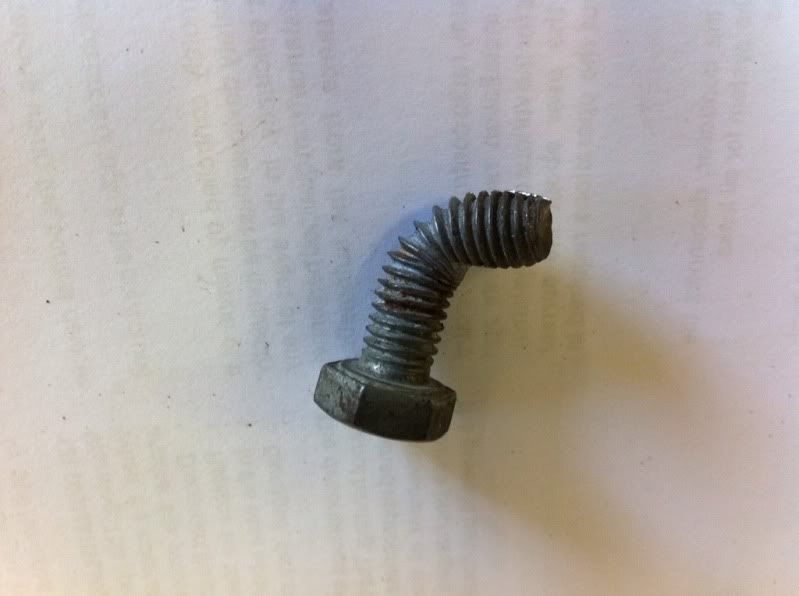
As expected it bent over to roughly 90 degrees without snapping.
I then did the same to a stailness bolt of similar dimensions.
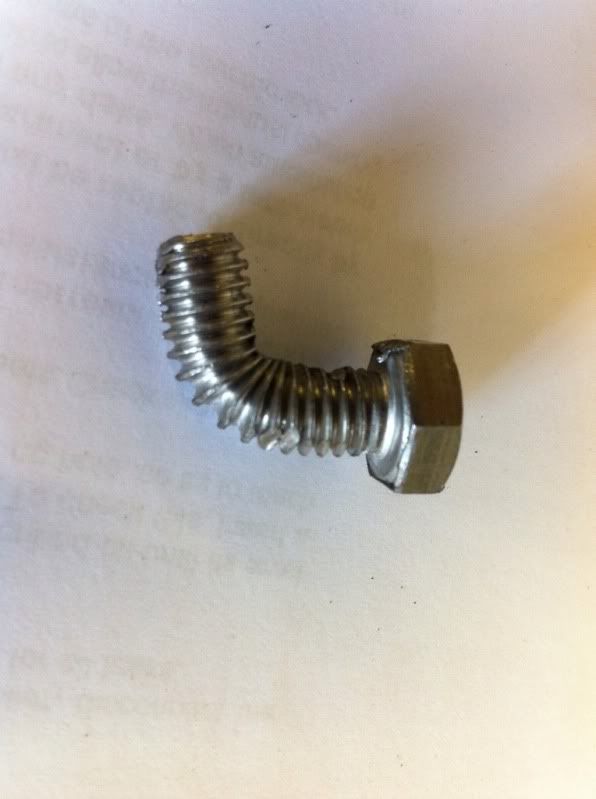
I expected it to be easier to bend over but it wasn't it felt about the same. I also expected it to snap or shatter but again it behaved in a similar fashion to the the steel bolt.
So there i was confused by what you have told me in this thread.
This is obviously a very crude experiment as i have no control over the force i was exerting with the hammer and i didn't take too much notice of how many times i hit the bolts.
A more scientific method was needed so seeing as I have a hydraulic press i thought i would use that. I can read off the force exerted on the pressure guage to keep the forces broadly similar.
So i took one of my old CV joint bolts, M10 cap heads, and supported it at either end and applied pressure in the middle. It took a little pressure before starting to bend but snapped once that pressure was increased.
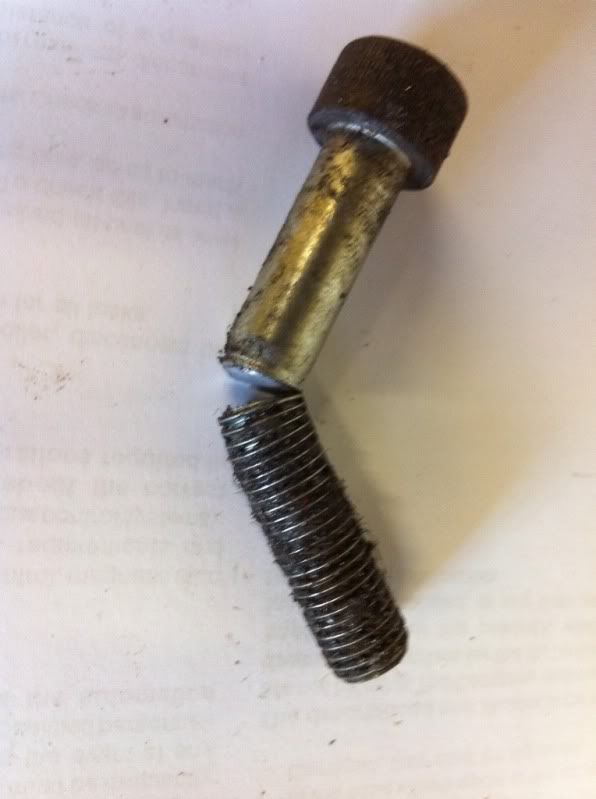
This was dissappointing as these bolts are subjected to fairly serious shear forces and shouodn't snap but to be fair the bending action has some tensile force involved as well. But to be sure i hadn't picked up a duff bolt i tried another.
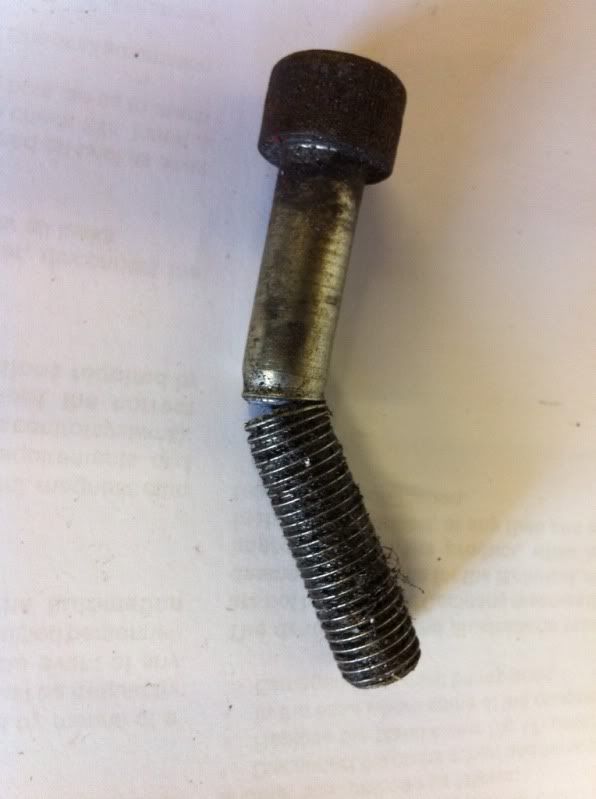
Same thing happened.
Ok how would a stainless version cope.
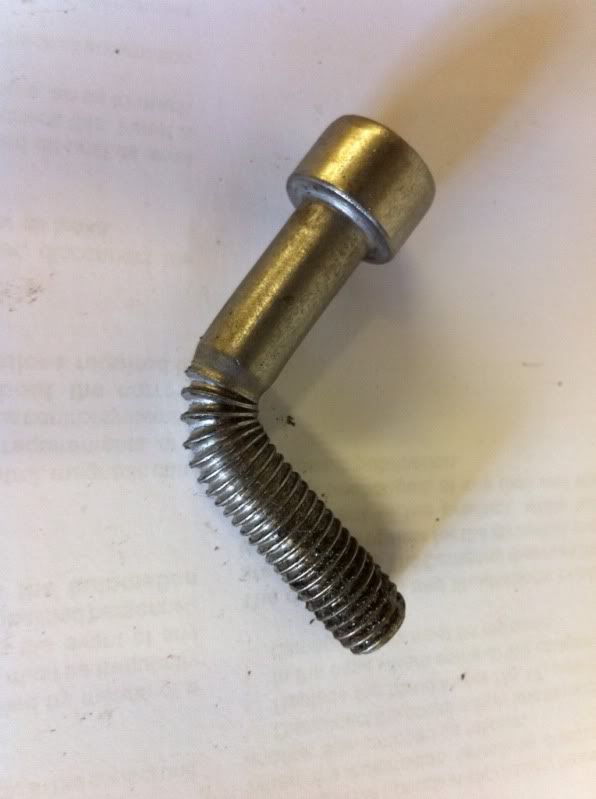
Better than i expected, slightly easier on the force required to bend it but it didn't show any signs of failing in the way the steel versions did.
I would prefer a bolt to bend under an abnormal load such as an impact to the suspension or steering so that you retain control of the vehicle rather than the bolts snapping with the potential resultatnt loss of control of the vehicle.
Does it make much difference then, bearing in mind the bolt sizes are probably much bigger than they really need to be just to give a large margin for error/misuse?
Interesting stuff eh????
Andy
So i carried out some crude tests on some stainless and standard plated steel bolts to see how they perform. First of all i put a standard plated hex bolt in my vice and thrashed it with a hammer.

As expected it bent over to roughly 90 degrees without snapping.
I then did the same to a stailness bolt of similar dimensions.

I expected it to be easier to bend over but it wasn't it felt about the same. I also expected it to snap or shatter but again it behaved in a similar fashion to the the steel bolt.
So there i was confused by what you have told me in this thread.
This is obviously a very crude experiment as i have no control over the force i was exerting with the hammer and i didn't take too much notice of how many times i hit the bolts.
A more scientific method was needed so seeing as I have a hydraulic press i thought i would use that. I can read off the force exerted on the pressure guage to keep the forces broadly similar.
So i took one of my old CV joint bolts, M10 cap heads, and supported it at either end and applied pressure in the middle. It took a little pressure before starting to bend but snapped once that pressure was increased.

This was dissappointing as these bolts are subjected to fairly serious shear forces and shouodn't snap but to be fair the bending action has some tensile force involved as well. But to be sure i hadn't picked up a duff bolt i tried another.

Same thing happened.
Ok how would a stainless version cope.

Better than i expected, slightly easier on the force required to bend it but it didn't show any signs of failing in the way the steel versions did.
I would prefer a bolt to bend under an abnormal load such as an impact to the suspension or steering so that you retain control of the vehicle rather than the bolts snapping with the potential resultatnt loss of control of the vehicle.
Does it make much difference then, bearing in mind the bolt sizes are probably much bigger than they really need to be just to give a large margin for error/misuse?
Interesting stuff eh????
Andy
Stainless steel can degrade after prolonged exposure to certain environments, in this case being salt. Its called chloride stress corrosion cracking, and is basically where chloride ions get in between the metal grains to weaken them, which can then lead to brittle fracture of the material. Give it a google if you're after more info.
brogenville said:
Stainless steel can degrade after prolonged exposure to certain environments, in this case being salt. Its called chloride stress corrosion cracking, and is basically where chloride ions get in between the metal grains to weaken them, which can then lead to brittle fracture of the material. Give it a google if you're after more info.
This corrosion process is usually accompanied by heat as well.Frequent failure process in refining/distillation towers.
Nick
Apache said:
Don't overlook the electrolytic corrosion aspect of SS and Steel
So consider this scenario and tell me which will corrode the most. A plated steel nut threaded onto a plated steel bolt or a stainless steel nut on a plated steel bolt, without any secondary treatment ie copperslip or grease?Else said:
Apache said:
Don't overlook the electrolytic corrosion aspect of SS and Steel
So consider this scenario and tell me which will corrode the most. A plated steel nut threaded onto a plated steel bolt or a stainless steel nut on a plated steel bolt, without any secondary treatment ie copperslip or grease?Gassing Station | General TVR Stuff & Gossip | Top of Page | What's New | My Stuff




